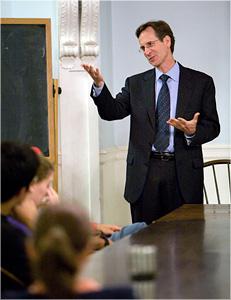October 2, 2008
Contact: John D’Angelo ’10
Public Affairs Intern
413/542-2195
| Listen to an audio recording of Bennett’s talk | |
| Read a transcript of Bennett's talk | |
| Watch a video interview between Prof. William Taubman and Bennett |
AMHERST, Mass.—“The story we have all been following … is one of competing narratives,” Philip Bennett, managing editor of The Washington Post, told an engaged audience in the Babbott Room of Amherst’s Octagon Wednesday, Oct.1, during a discussion of the presidential election. “We are witnessing a contest for control of the story between the traditional news media, new sources of news and information, the campaigns themselves, special interests and interested and often anonymous parties.”
 Philip Bennett speaks at Amherst College |
Addressing the crowd of nearly 90 students, faculty, staff and members of the community, Bennett examined how the candidates have cultivated these narratives and the role media has played in reinforcing or challenging such constructions. The talk, a lecture titled “The Presidential Race: What’s the Story?” sponsored by the college’s Victor S. Johnson Lectureship Fund, was often humorous and frank and featured a question-and-answer session with the audience at the end.
According to Bennett, the narratives of the candidates have become the predominant focus of this year’s presidential campaign. Each has carefully crafted his biography to create a certain image, while attempting to deconstruct that of his opponent. As a result, the substantive issues have effectively been trumped by the interest in the personal qualities of the candidates. “It is to reach instinct and emotion that the great election campaigns are organized. Whatever issues are discussed are discussed only secondarily in order to reach emotions,” he explained. “As McCain’s campaign advisor said, ‘This election is not about issues; this election is about a composite view of what people take away from the candidates.’”
Bennett then went on to discuss his role as an editor of the print media in critically evaluating and reporting on these narratives. The Washington Post, he said, has expanded to include not just a print edition but an online version as well. And while his newspaper and many other major print publications have begun embracing blogs and online media, those traditional media sources have retained a much-needed emphasis on investigative journalism and fact checking. That is in sharp contrast to the proliferation of blogs and Internet media, which has created a type of “instantaneous journalism … which produces its own rules,” Bennett explained. “New pushes out old and trivia can trump substance.” Newspapers, he said, maintain a crucial role by separating fact from opinion. With myriad sources contributing to the candidate’s narrative, traditional media plays an important role in evaluating these claims.
Wrapping up his speech, Bennett was optimistic about the role that the media—specifically print media—can play in covering the elections. Newspapers and other traditional news sources are not “gatekeepers” to him, he said; rather, they are enhanced by these different perspectives. He added that he believes in the values of his newspaper and others like it, and feels that these new and independent media will eventually develop the commitments to investigative journalism and fact-checking that characterize traditional media. He concluding by reiterating that the role of all journalists, regardless of publication, is to “challenge the official story while having the courage to be unpopular.”